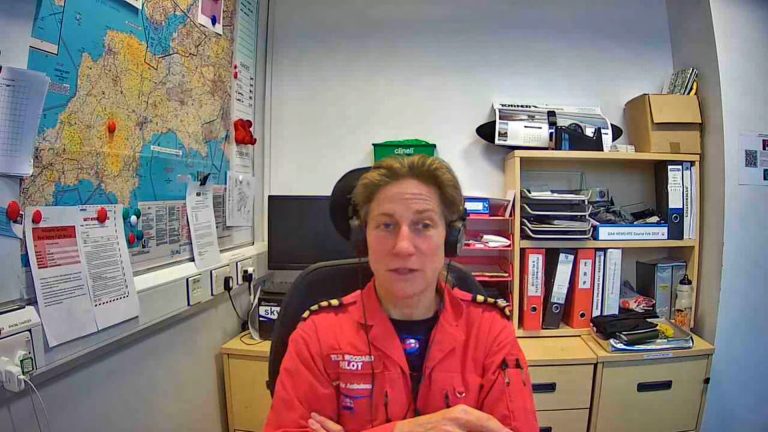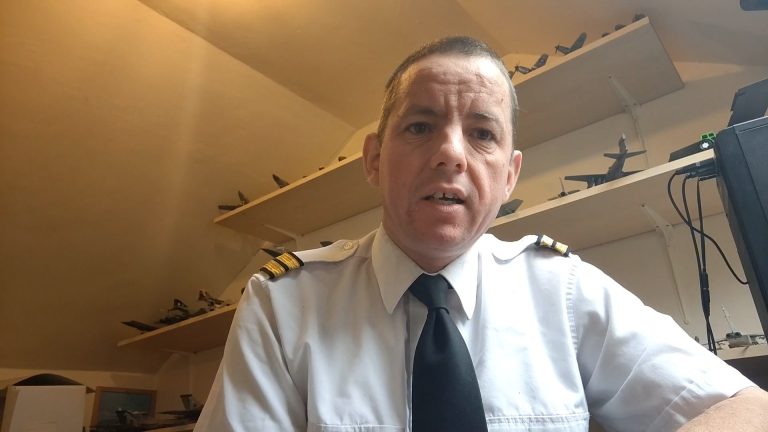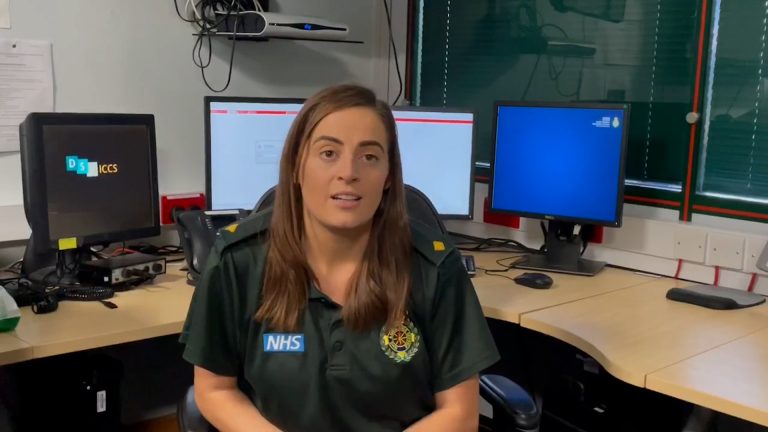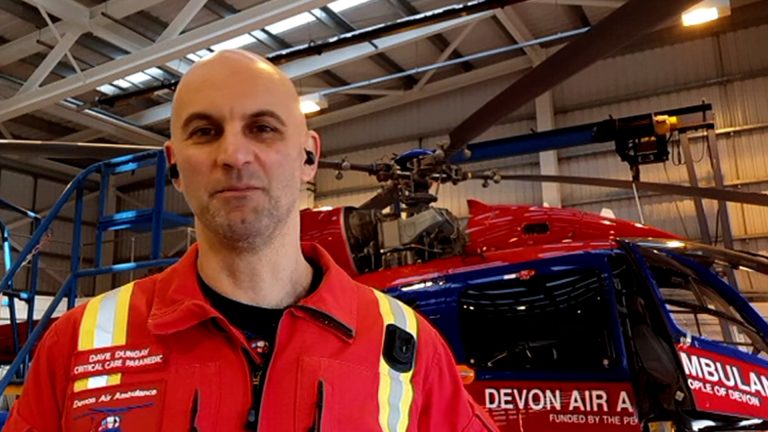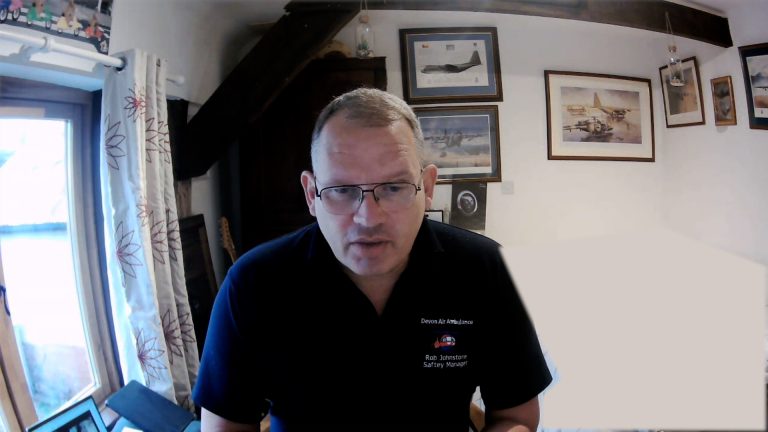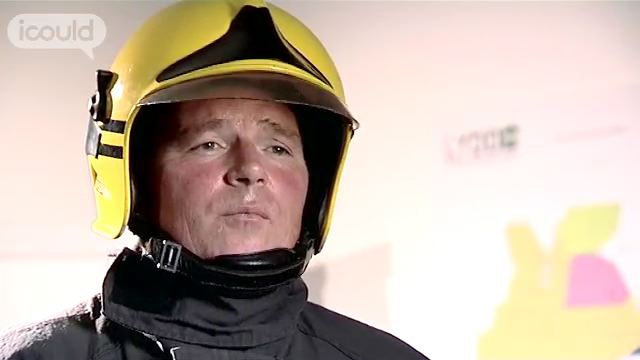Helicopter Pilot
Devon Air Ambulance
00:00:06:24 – 00:00:08:05
Hi, my name is Tilda.
00:00:08:05 – 00:00:11:15
I’m a HEMS pilot. Helicopter, emergency
00:00:11:15 – 00:00:14:24
medical services pilot, and I fly for Devon Air Ambulance.
00:00:15:13 – 00:00:18:21
My job involves flying a helicopter
00:00:19:08 – 00:00:23:11
in order to get the critical care team, which consists of either
00:00:23:11 – 00:00:28:10
two paramedics and a critical care doctor or just two paramedics to an incident.
00:00:28:13 – 00:00:31:03
We are literally bringing A&E to the scene.
00:00:31:13 – 00:00:34:14
So it’s a 999 call out
00:00:35:14 – 00:00:39:01
where they say they need a doctor or critical care paramedic.
00:00:39:05 – 00:00:42:22
It’s a lot more service than the land ambulance can provide,
00:00:42:22 – 00:00:45:04
and we carry a lot more specialist equipment
00:00:45:12 – 00:00:48:21
that you wouldn’t be able to afford to put on every land ambulance but you could afford to put
00:00:48:23 – 00:00:50:08
perhaps on two helicopters.
00:00:50:08 – 00:00:55:08
The best bit is when it’s a happy ending and that you do save a life
00:00:55:18 – 00:00:57:24
and you’ve really made a difference.
00:00:58:14 – 00:01:01:21
Obviously, when it’s not a successful outcome,
00:01:02:20 – 00:01:04:00
it’s very difficult.
00:01:04:00 – 00:01:06:15
Then you really feel for the people that are left behind.
00:01:07:15 – 00:01:11:20
So I find, yeah, that can be very, quite emotional.
00:01:11:20 – 00:01:13:22
But so I’ve learned to become detached from it.
00:01:13:22 – 00:01:16:12
So you have to be quite
00:01:16:20 – 00:01:19:14
strong about it and just switch off.
00:01:19:14 – 00:01:24:20
It all started when I was about 13 and we had a careers form that came around school and said,
00:01:24:20 – 00:01:26:08
What do you want to be when you leave school?
00:01:26:08 – 00:01:30:16
And so I said either a stunt woman, a secret agent,
00:01:30:16 – 00:01:34:23
an astronaut or pilot, and the pilot was the easier option.
00:01:36:18 – 00:01:39:05
So I did actually write to the Air Force
00:01:39:07 – 00:01:41:14
when I was about that age because I knew they didn’t
00:01:41:14 – 00:01:44:14
let women fly in the military – I said ‘why don’t you let me fly?’
00:01:44:15 – 00:01:45:22
And they said, Well, you never know.
00:01:45:22 – 00:01:48:22
Perhaps by the time you’re old enough, things might have changed.
00:01:49:00 – 00:01:49:23
And they did.
00:01:49:23 – 00:01:52:09
So I actually started flying when I was at university.
00:01:52:10 – 00:01:54:00
I joined the University Air Squadron
00:01:54:00 – 00:01:56:20
which is run by the Air Force and they teach you how to fly.
00:01:56:23 – 00:01:58:01
And then I joined from there.
00:01:59:06 – 00:02:02:08
I’d say that three strong points that you need to become a HEMS
00:02:02:12 – 00:02:05:11
pilot would be to be flexible, to be able to put up with
00:02:06:17 – 00:02:10:04
rapid planning and depending on the weather, depending
00:02:10:04 – 00:02:14:00
on the type of the incident where you need to go, who you’re carrying.
00:02:14:06 – 00:02:18:07
Be fairly practical and be willing to get your hands dirty,
00:02:19:09 – 00:02:21:17
often landing in really muddy fields,
00:02:22:15 – 00:02:25:18
having to help move the patient to and out of the aircraft,
00:02:27:12 – 00:02:30:00
and also be able to stay emotionally detached.
00:02:30:11 – 00:02:32:17
Because obviously you do get to meet
00:02:33:16 – 00:02:36:14
the patient’s family or relatives quite often.
“The best bit is when it’s a happy ending and that you do save a life and you’ve really made a difference.” When she was 13, Tilda wanted to be a stunt woman, a secret agent, an astronaut or a pilot. She went on to join her university air squadron where she learned how to fly. She then joined the RAF but now works as a helicopter pilot for the ambulance service.
More information about Ship and hovercraft officers
The UK average salary is £29,813
There are 37.5 hours in the average working week
The UK workforce is 47% female and 53% male
Future employment
- Allocates duties to ship’s officers and co-ordinates and directs the activities of deck and engine room ratings
- Directs or undertakes the operation of controls to inflate air cushions, run engines and propel and steer ships, hovercraft and other vessels
- Locates the position of vessel using electronic and other navigational aids such as charts and compasses and advises on navigation where appropriate
- Monitors the operation of engines, generators and other mechanical and electrical equipment and undertakes any necessary minor repairs
- Maintains radio contact with other vessels and coast stations
- Prepares watch keeping rota and maintains a look-out for other vessels or obstacles
- Maintains log of vessel’s progress, weather conditions, conduct of crew, etc



